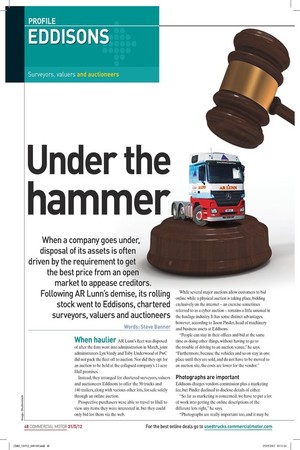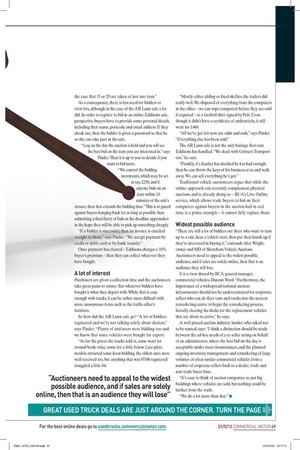Under the
Page 42

Page 43

If you've noticed an error in this article please click here to report it so we can fix it.
hammer
When a company goes under, disposal of its assets is often driven by the requirement to get the best price from an open market to appease creditors.
Following AR Lunn’s demise, its rolling stock went to Eddisons, chartered surveyors, valuers and auctioneers
Words: Steve Banner When haulier AR Lunn’s fleet was disposed of after the firm went into administration in March, joint administrators Lyn Vardy and Toby Underwood of PwC did not pack the fleet off to auction. Nor did they opt for an auction to be held at the collapsed company’s 11-acre Hull premises.
Instead, they arranged for chartered surveyors, valuers and auctioneers Eddisons to offer the 50 trucks and 140 trailers, along with various other lots, for sale solely through an online auction.
Prospective purchasers were able to travel to Hull to view any items they were interested in, but they could only bid for them via the web. While several major auctions allow customers to bid online while a physical auction is taking place, bidding exclusively on the internet – an exercise sometimes referred to as a cyber auction – remains a little unusual in the haulage industry. It has some distinct advantages, however, according to Jason Pinder, head of machinery and business assets at Eddisons.
“People can stay in their offices and bid at the same time as doing other things, without having to go to the trouble of driving to an auction venue,” he says. “Furthermore, because the vehicles and so on stay in one place until they are sold, and do not have to be moved to an auction site, the costs are lower for the vendor.”
Photographs are important
Eddisons charges vendors commission plus a marketing fee, but Pinder declined to disclose details of either.
“So far as marketing is concerned, we have to put a lot of work into getting the online descriptions of the different lots right,” he says.
“Photographs are really important too, and it may be the case that 15 or 20 are taken of just one item.” As a consequence, there is less need for bidders to view lots, although in the case of the AR Lunn sale a lot did. In order to register to bid in an online Eddisons sale, prospective buyers have to provide some personal details, including their name, postcode and email address. If they check out, then the bidder is given a password so that he or she can take part in the sale.
“Log on the day the auction is held and you will see the best bid on the item you are interested in,” says Pinder. Then it is up to you to decide if you want to bid more.
“We control the bidding increments, which may be set at say, £250, and if anyone bids on an item within 10 minutes of the sale’s closure, then that extends the bidding time.” This is to guard against buyers hanging back for as long as possible then submitting a final flurry of bids as the deadline approaches in the hope they will be able to pick up something cheaply.
“If a bidder is successful, then an invoice is emailed straight to them,” says Pinder. “We accept payment by credit or debit card or by bank transfer.” Once payment has cleared – Eddisons charges a 10% buyer’s premium – then they can collect whatever they have bought.
A lot of interest
Purchasers are given a collection time and the auctioneers take great pains to ensure that whatever bidders have bought is what they depart with. While that is easy enough with trucks, it can be rather more difficult with more anonymous items such as the traffic office’s furniture.
So how did the AR Lunn sale go? “A lot of bidders registered and we’re not talking solely about dealers,” says Pinder. “Plenty of end-users were bidding too and we know that some vehicles were bought for export.
“As for the prices the trucks sold at, some went for around book value, some for a little below. Late-plate models attracted some keen bidding, the oldest ones were well-received too, but anything that was 07/08-registered struggled a little bit. “Mostly either sliding or fixed skellies, the trailers did really well. We disposed of everything from the computers in the office – we can wipe computers before they are sold if required – to a football shirt signed by Pelé. Even though it didn’t have a certificate of authenticity, it still went for £460.
“All we’ve got left now are odds and sods,” says Pinder. “Everything else has been sold.” The AR Lunn sale is not the only haulage fleet sale Eddisons has handled. “We dealt with Grimers Transport too,” he says.
“Frankly, if a haulier has decided he has had enough, then he can throw the keys of his business at us and walk away. We can sell everything he’s got.” Traditional vehicle auctioneers argue that while the online approach can certainly complement physical auctions and is already doing so – BCA’s Live Online service, which allows trade buyers to bid on their computers against buyers in the auction hall in real time, is a prime example – it cannot fully replace them.
Widest possible audience
“There are still a lot of bidders out there who want to turn up to a sale, hear a vehicle start, then put their hands up if they’re interested in buying it,” contends Alex Wright, owner and MD of Shoreham Vehicle Auctions. Auctioneers need to appeal to the widest possible audience, and if sales are solely online, then that is an audience they will lose.
It is a view shared by BCA general manager, commercial vehicles, Duncan Ward. “Furthermore, the importance of a widespread national auction infrastructure should not be underestimated for corporate sellers who can de-fleet vans and trucks into the nearest remarketing centre to begin the remarketing process, literally clearing the decks for the replacement vehicles that are about to arrive,” he says.
A well-placed auction industry insider, who asked not to be named, says: “I think a distinction should be made between the ad-hoc needs of a re-seller acting on behalf of an administrator, where the best bid on the day is acceptable under most circumstances, and the planned ongoing inventory management and remarketing of large volumes of often similar commercial vehicles from a number of corporate sellers back to a dealer, trade and non-trade buyer base.
“It’s easy to think of auction companies as just big buildings where vehicles are sold, but nothing could be further from the truth.
“We do a lot more than that.” ■













































